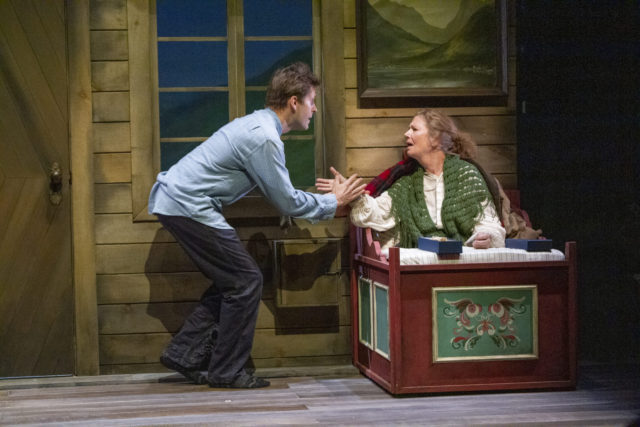
Peter Gnit (Joe Curnutte) takes a break on a mountainside in New York premiere of Gnit (photo © Henry Grossman)
GNIT
Theatre for a New Audience, Polonsky Shakespeare Center
262 Ashland Pl. between Lafayette Ave. & Fulton St.
Tuesday – Sunday through November 21, $20-$125
866-811-4111
www.tfana.org
In Will Eno’s 2014 Broadway play, The Realistic Joneses, Jennifer tells John, “I think you have a nice way with words.” Eno has demonstrated his own “nice way with words” throughout his career; probing language and communication is ingrained in his MO. Such is the case with the New York premiere of his 2013 play, Gnit (pronounced “Guh-nit”), which opened today at Theatre for a New Audience’s Polonsky Shakespeare Center, in a sparkling version directed by longtime Eno collaborator Oliver Butler.
Gnit is an imaginative, clever adaptation of Henrik Ibsen’s 1867 five-act verse play, Peer Gynt, which was inspired by a Norwegian fairy tale. The title character, Peter Gnit (Joe Curnutte), is on a search for his “true self,” encountering a series of unusual people who speak with him in offbeat patterns; they converse in non sequiturs, repetition, and abstraction with a deadpan glibness. “Do you know who I am?” he asks a stranger, who answers, “Yes, I do. Actually, let me be more honest, here — no, I don’t. I’m sure you’re someone.” When an outdoorswoman (Christy Escobar) tells him, “You’re just like everyone else,” Peter responds, “Me? No. That’s probably the problem. I’m not enough like everyone else.” A woman in green (Escobar) says to him, “You look like a person.” Peter replies, “Well, I try to be myself. Because, really, that’s just a large part of who I am.”
But he has no idea who he is and no understanding of how to relate to others. Even his name is a question. “‘Gnit?’ I’ve heard about you. I’ve always wondered about that name — where’s it from?” Solvay (Jasmine Batchelor) asks. “It’s a typo,” Peter admits. And his beloved, sickly mother (Deborah Hedwall) explains, “When you begin sentences with the word ‘I,’ I’m not even sure you know who you’re talking about. Because maybe I didn’t hold you enough when you were little.”
The play opens with Peter returning home to discover his childhood sweetheart, Sarah (Escobar), is getting married to a man named Moynihan (Jordan Bellow) that very day. He sneaks into the wedding to try to stop it, where he encounters Town, ingeniously portrayed by David Shih in hysterical monologues in which he plays numerous people gossiping about this and that, drinking, and complaining, switching between characters like a machine gun. Peter also meets Solvay, who he instantly falls in love with even though he is there to run away with the bride. He is soon off on an adventure that will take him around the world, chancing upon a sexy woman on a mountainside (Escobar), a witchy lady (Escobar) and her father (Shih), an international businessman (Shih), an unsympathetic bartender (Batchelor), a cigarette girl selling maps (Escobar), a beggar (Hedwall), a shackled man (Bellow) in a psychiatric clinic, and a disembodied voice that calls itself the Middle.

Peter (Joe Curnutte) is late to see his mother (Deborah Hedwall) in Will Eno play (photo © Gerry Goodstein)
No matter where he is or what happens to him, he proceeds at an even keel, as if he’s walking through his life without actually fully engaging in it, unconcerned about how he treats anyone and shunning all responsibilities. “Can you tell me what you were born for? Honestly? Because I can’t,” his mother says to him. He responds, “I’m on a journey to discover, to uncover, the authentic self,” but it’s a narcissistic, egotistical solo trip, one on which he chooses to ignore anyone and anything beyond his own immediate needs and desires, never thinking about tomorrow or how his actions might impact others. “It does take a certain temerity to see yourself at the center of it all,” a stranger (Bellow) acknowledges.
Gnit made its world premiere at the Humana Festival in Louisville in March 2013 and has been slightly revised for its New York debut, which was supposed to happen in March 2020 but was put on hold because of the pandemic. Curnutte is superb as Peter, melding the wackiness of Zach Braff with the hotness of David Boreanaz; the audience wants to hate Peter but we just can’t help but root for him no matter how awful he gets. The rest of the cast dazzles, playing more than thirty characters among them, swirling around Curnutte, pulling off seemingly impossible quick changes as they appear, disappear, and reappear in the blink of an eye. (Ásta Bennie Hostetter and Avery Reed designed the costumes, with lighting by Amith Chandrashaker, sound by Lee Kinney, and original music by Tony and Grammy nominee Daniel Kluger.)
Kimie Nishikawa’s lush set recalls Beckett’s Happy Days and Waiting for Godot, a clearly fake landscape with a projection of a lake and mountains in the back, signifying the great world beyond Peter’s home. For the former, Beckett called for an “expanse of scorched grass rising centre to low mound. Gentle slopes down to front and either side of stage . . . Very pompier trompe-l’oeil backcloth to represent unbroken plain and sky receding to meet in far distance.” Also, just as Winnie, in Happy Days, is buried at the top of the mound, Gnit opens with Peter’s mother in bed vertically, the lower half of her body hidden. And in a specific nod to Godot, a solitary tree in Nishikawa’s set changes after intermission. Eno has counted Beckett as one of his inspirations; his dialogue is nothing if not Beckett-esque. In addition, the facades of small houses occasionally lower from the ceiling (don’t miss how a framed image in Peter’s house matches the projection).

Town (David Shih) shares a toast with Peter (Joe Curnutte) in retelling of Ibsen classic (photo © Gerry Goodstein)
The search for identity, how we communicate, and the concept of home, explored with a wry sense of humor and, at times, outright slapstick, have been fundamental in many of Eno’s works, from Wakey, Wakey and The Realistic Joneses to Pulitzer finalist Thom Pain (based on nothing) and Title and Deed. They are even more central in Gnit, in which the telling is just as important as the story.
Obie winner Butler (What The Constitution Means to Me, The Amateurs) knows just where Eno is coming from, guiding the 110-minute show with an unending, endearing charm. At one point, Peter says, “There is a limit to the magic powers of language.” In the skillful hands of Eno and Butler, I would have to disagree.